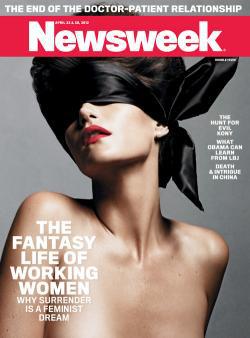As we reported on XX Factor earlier this week, Katie Roiphe, a cultural critic with polemical tendencies and a regular Slate columnist, has penned a cover story for Newsweek on the popularity of submissive sex among working women. Roiphe based her argument on a selection of cultural objects, including the soft-core erotic novel Fifty Shades of Grey and the sex scenes from HBO’s controversial new series Girls; and, predictably, many people responded with varying degrees of criticism, including two of her own colleagues (myself and Amanda Marcotte) here at Slate. All of which is great—the point of much of Roiphe’s writing is to incite discussion, even outrage, because that’s what polemicists do.
But there are useful, productive ways of critiquing a piece of argumentative writing, and then there are bad ones. Gawker, for example, regularly dismisses everything Roiphe writes with what amounts to a temper tantrum. Which is fine, but not particularly interesting. Former New York Times critic and current Yahoo! News national correspondent Virginia Heffernan, on the other hand, communicated her distaste for Roiphe’s piece in terms so sexist, condescending, and weirdly personal that I can’t let it pass without comment.
The gist of Heffernan’s critique is that Newsweek/Daily Beast editor Tina Brown must have tricked or otherwise seduced Roiphe into writing her article in a steamy scene of editorial sadomasochism:
[Tina Brown] made dupes of her readers—as well as of the highly suggestible writer Katie Roiphe—once again … she likes to ask lady writers to deliver humiliating “personal histories” that feature self-loathing and lurid intimate disclosures, on the promise that they can publish anonymously. Once the droning, predictable, scandalous articles are done … Tina appeals to the writer’s vanity. The article is terse and fearless and elegant! You’re Joan Didion! (always Joan Didion). You must put your name on this!
So: impressionable, apparently agency-lacking lady-writers like Roiphe (and Daphne Merkin, another famous provocateur that Heffernan impugns) are merely grist for Brown’s media mill? And as a delicate woman writer, Roiphe couldn’t possibly have thought to write about a (pretty tame) sexual issue without the corrupting pressure of some outside force?
Heffernan suggests that Roiphe has been “humiliated” by the article, but, by my reading, it’s the former who’s actually out to humiliate the latter in some twisted form of victim-blaming. It’s as if Heffernan is saying, “Tina Brown editorially raped you, Katie Roiphe, so why don’t you just slink away in disgrace!”
Strange that Heffernan doesn’t seem to recall Roiphe’s long history of writing exactly this kind of piece of her own volition for a variety of publications, especially considering that the two have been personally acquainted for at least a decade.*
In any case, there’s no need to worry; Roiphe assured her Facebook followers this week that “everything that happened between me & Tina Brown was entirely consensual.”
Since we’re all trying to be honest here, I should disclose that I am a former student and research assistant of Roiphe’s. But I also have no problem being (productively) critical of her work.
*Correction, April 25, 2012: This post originally reported that Newsweek/Daily Beast editor Tina Brown once fired journalist Virginia Heffernan from Talk magazine. Heffernan was not fired, but left Talk voluntarily in 2000.
